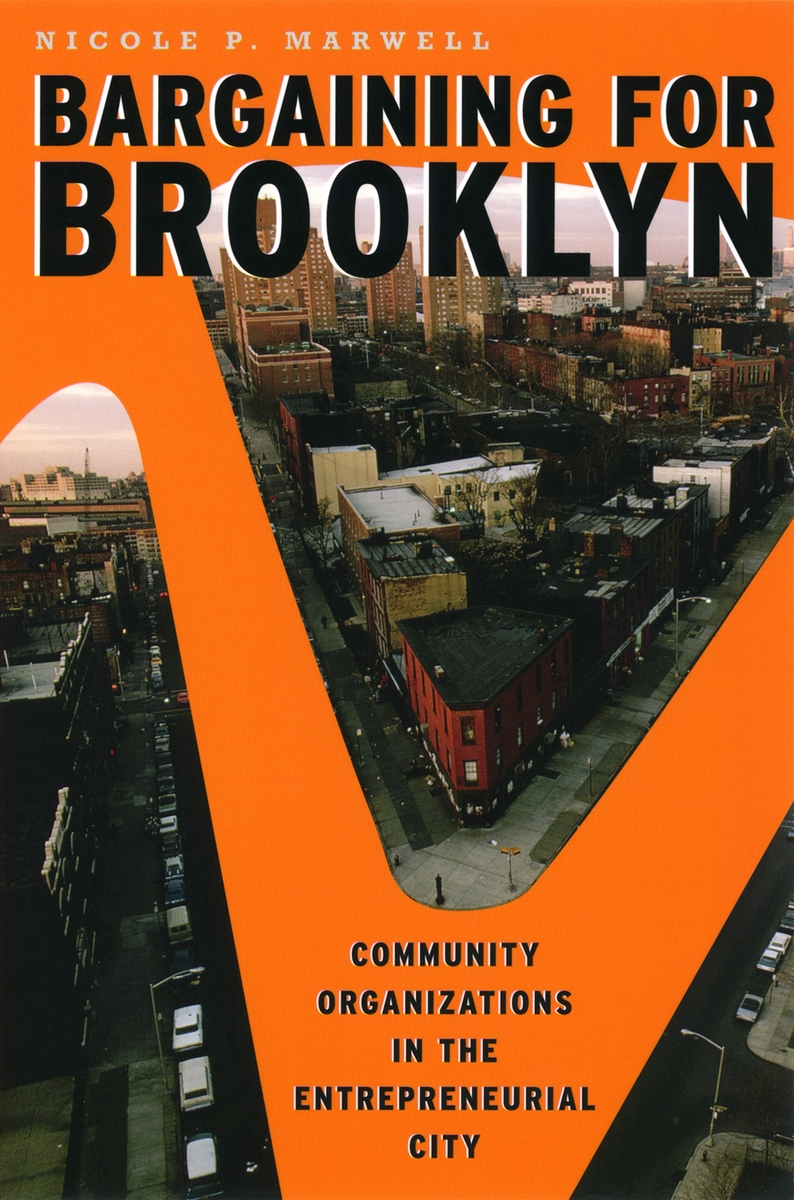Bargaining for Brooklyn
Community Organizations in the Entrepreneurial City
University of Chicago Press, 2007
Cloth: 978-0-226-50906-8 | Paper: 978-0-226-50907-5 | Electronic: 978-0-226-50908-2
DOI: 10.7208/chicago/9780226509082.001.0001
Cloth: 978-0-226-50906-8 | Paper: 978-0-226-50907-5 | Electronic: 978-0-226-50908-2
DOI: 10.7208/chicago/9780226509082.001.0001
AVAILABLE FROM
University of Chicago Press (cloth, paper, ebook)Amazon Kindle (PDF)
Apple Books
Barnes & Noble Nook
Brytewave (CafeScribe-Follett Higher Ed)
Chegg Inc
DeGruyter Multi-User Ebook Program
ebrary
EBSCO eBooks (formerly NetLibrary)
Google Play
Kno
OverDrive
University Press Scholarship Online (UPSO)
ABOUT THIS BOOKAUTHOR BIOGRAPHYREVIEWSTABLE OF CONTENTS
ABOUT THIS BOOK
When middle-class residents fled American cities in the 1960s and 1970s, government services and investment capital left too. Countless urban neighborhoods thus entered phases of precipitous decline, prompting the creation of community-based organizations that sought to bring direly needed resources back to the inner city. Today there are tens of thousands of these CBOs—private nonprofit groups that work diligently within tight budgets to give assistance and opportunity to our most vulnerable citizens by providing services such as housing, child care, and legal aid.
Through ethnographic fieldwork at eight CBOs in the Brooklyn neighborhoods of Williamsburg and Bushwick, Nicole P. Marwell discovered that the complex and contentious relationships these groups form with larger economic and political institutions outside the neighborhood have a huge and unexamined impact on the lives of the poor. Most studies of urban poverty focus on individuals or families, but Bargaining for Brooklyn widens the lens, examining the organizations whose actions and decisions collectively drive urban life.
Through ethnographic fieldwork at eight CBOs in the Brooklyn neighborhoods of Williamsburg and Bushwick, Nicole P. Marwell discovered that the complex and contentious relationships these groups form with larger economic and political institutions outside the neighborhood have a huge and unexamined impact on the lives of the poor. Most studies of urban poverty focus on individuals or families, but Bargaining for Brooklyn widens the lens, examining the organizations whose actions and decisions collectively drive urban life.
AUTHOR BIOGRAPHY
Nicole P. Marwell is associate professor of sociology and Latina/o studies and director of the Workshop on Nonprofit Organizations in Economy and Society at Columbia University.
REVIEWS
"A significant addition to the literature on urban policy and community development."
— Choice"Marwell's ethnography is truly exceptional in illustrating the byzantine institutional setting that must be navigatied before CBOs can connect neighborhood residents to the resources they need. . . . Bargaining for Brooklyn has much to offer, not just to ethnographers of urban poverty and community studies, but to urban, political, and organizations sociology broadly. The writing is accessible, and the cases are compelling. . . . Not only will the book be widely read and assigned, it should be a central text on urban poverty, interscalar institutional analysis, and CBOs. More generally, Marwell's voice is a welcome addition to an already illustrious cast of contemporary urban ethnographers."
— Michael McQuarrie, American Journal of Sociology"Marwell provides an excellent community history of Puerto Ricans and Latinos in Brooklyn. . . . [The book] is richly detailed and likely to serve as a wonderful resource for future research."
— J.R. Sanchez, CentroTABLE OF CONTENTS
List of illustrations
Formal Organizations and the Problem of Social Order in the City - Nicole P. Marwell
A Place to Live - Nicole P. Marwell
A Voice in Politics - Nicole P. Marwell
A Path to Work - Nicole P. Marwell
Organizations and Participation - Nicole P. Marwell
Conclusion - Nicole P. Marwell
Acknowledgments
Appendix. Notes on Research Design and Method
Works Cited
Index
